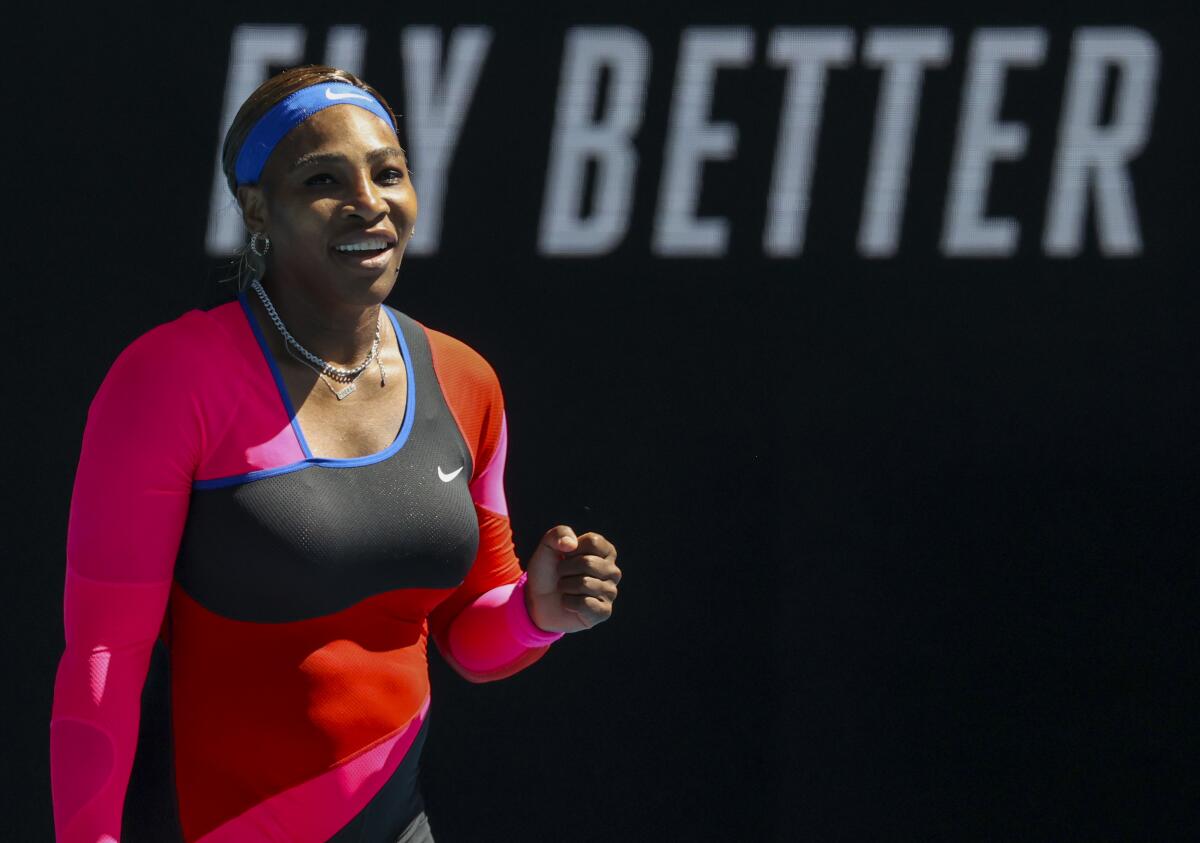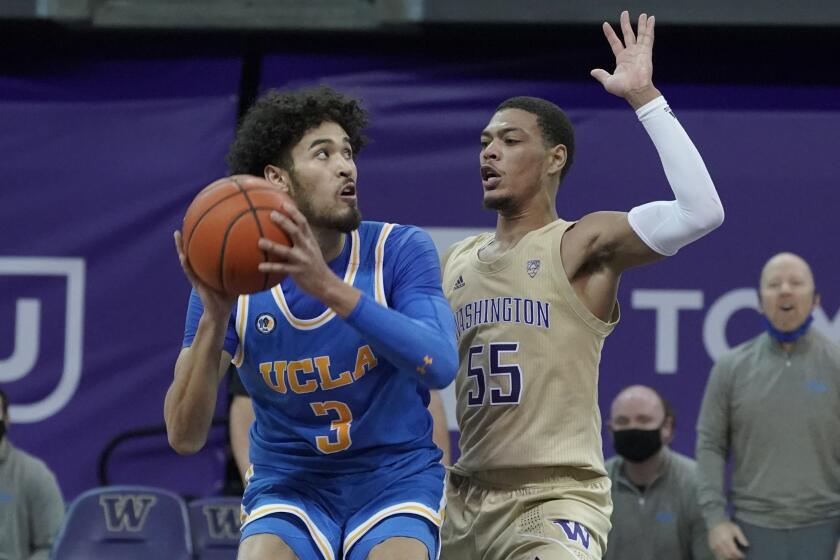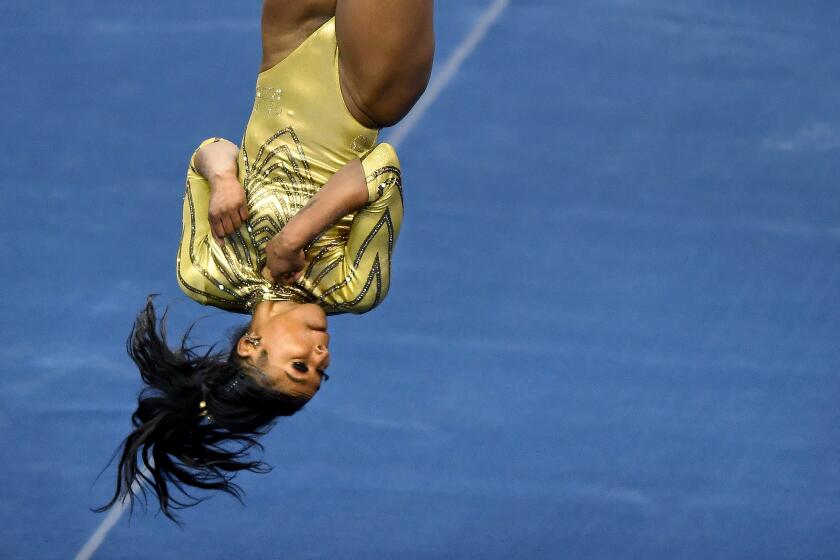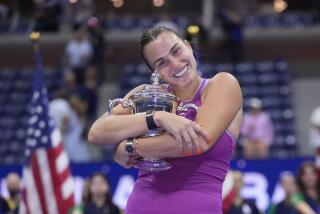Down but not out: Serena Williams advances to Australian Open quarterfinals

- Share via
MELBOURNE, Australia — Serena Williams tumbled to the ground, her heavily taped right ankle twisting, her body contorting, her racket flying.
This was early in the second set of a competitive-as-can-be matchup in the Australian Open’s fourth round against a younger version of herself — stinging serves, huge groundstroke cuts, a fierce streak — and during a stretch Sunday (Saturday night Pacific time) when things seemed to be slipping away.
Williams quickly put up a hand to indicate she was OK, got up to retie the laces of her right shoe and, while it took her a bit to regain control, she did just in the nick of time. Grabbing the last two games, Williams pulled out 6-4, 2-6, 6-4 victory over No. 7 seed Aryna Sabalenka to reach the quarterfinals at Melbourne Park.
“I am happy to get through that one. It wasn’t easy,“ said Williams, who moved closer to an eighth Australian Open championship and record-tying 24th Grand Slam singles title overall. “She was teeing off on every shot.”
Third baseman Justin Turner will return to the Dodgers on a two-year contract, even though it took until four days before spring training to get it done.
Leave the subtlety, the nuance, to others. These two hit the ball hard, over and over again in Rod Laver Arena, exhibiting plenty of power. It’s just that Williams was barely better. She ended up with more winners, 30-24, and more aces, 9-4, while cranking up her best-in-the-game serve to as fast as 126 mph.
When Williams needed to volley, she did, rather well, claiming 13 of 15 points when she went to the net. More importantly, she covered the court much in the way she did in her younger days, when opponents’ apparent winners were rendered mere fodder for her own strikes.
That left Sabalenka — a 22-year-old from Belarus playing in only her second fourth-round Slam match — visibly and audibly frustrated. She frequently would scream after lost points. She spiked her racket too.
With the high quality of the match, the only shame was that no fans were there to see it in person. That’s because this was Day 2 of the five-day lockdown imposed by the Victoria state government after some COVID-19 cases emerged at a local hotel. (Any cheering or chatter TV viewers heard at home was being piped in to broadcasters’ feeds).
Up next, Williams is assured of facing another Grand Slam champion: Simona Halep or Iga Swiatek were to meet Sunday night.
The other quarterfinal on that half of the draw will be Naomi Osaka against unseeded 35-year-old Hsieh Su-wei of Taiwan.
Johnny Juzang finished with a career-high 32 points, making five three-pointers, to help UCLA win 64-61 at Washington and end its two-game skid.
Osaka barely got there, saving two match points and grabbing the last four games en route to edging Garbine Muguruza 4-6, 6-4, 7-5.
The third-seeded Osaka returns to the quarterfinals of a tournament she won in 2019 for one of her three major trophies. Osaka ran her winning streak to 18 matches — a run that included a U.S. Open title in September — and put a stop to Muguruza’s own fine form of late.
Heading into Sunday, two-time major champion Muguruza had been broken only once in this Australian Open. She had dropped a total of 10 games through three matches.
But Osaka broke the 2020 runner-up’s serve five times on a cloudy day with the temperature in the mid-60s Fahrenheit.
“I was a bit intimidated because I knew that she was playing really well coming into this match,” Osaka said. “In the stressful points, I feel like I just had to go within myself. And I know that today I probably hit a lot of unforced errors, but I feel like it was what I needed to do because I couldn’t really give her any short balls because she would finish it.”
Osaka wound up with more unforced errors, 36-28, but also more winners, 40-24.
“She’s playing great. Big shots, big serve,” Muguruza said. “That gives her a lot of free points.”
Retracing the history of the internet’s favorite college gymnastics routines, including several by UCLA athletes.
The key moment came when Osaka was serving at 15-40 while trailing 5-3 in the final set. Muguruza could not convert either of those match points: Osaka delivered one of her 11 aces at 118 mph on the first; Muguruza missed a groundstroke on the second.
Fifteen minutes later, the match would be over.
The first man to win Sunday was completely unexpected: Aslan Karatsev, a 27-year-old Russian qualifier who is ranked 114th, is the first player in a quarter century to reach the quarterfinals in his Grand Slam debut. Karatsev eliminated 20th-seeded Felix Auger-Aliassime 3-6, 1-6, 6-3, 6-3, 6-4.
The 71st-ranked Hsieh’s 6-4, 6-2 victory over 2019 French Open finalist Marketa Vondrousova made her the oldest woman to make her major quarterfinal debut in the professional era.
Hsieh plays with an unusual style that includes two-handed shots off both sides, and that might have flustered the 19th-seeded Vondrousova, who made 31 unforced errors, 13 more than the winner.
This is the 38th main-draw appearance at a Grand Slam tournament for Hsieh, who beat 2019 U.S. Open champion Bianca Andreescu in the second round.
“I try to pretend I’m only 18 years old,” Hsieh joked when a reporter asked her about her age.
Hsieh also made herself laugh when she cracked about her breakthrough victory: “It feels not real, because there were no fans there.”
More to Read
Go beyond the scoreboard
Get the latest on L.A.'s teams in the daily Sports Report newsletter.
You may occasionally receive promotional content from the Los Angeles Times.













